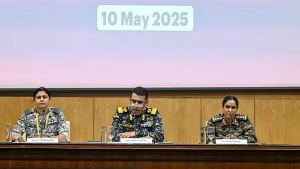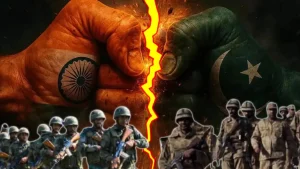New Delhi – Foreign Secretary Vikram Misri on ceasefire violation has taken a firm stance, announcing that India has observed “repeated violations” of the ceasefire understanding reached with Pakistan just yesterday. During an urgent press briefing in New Delhi on Sunday, Misri emphasized that Indian armed forces are delivering “adequate and appropriate” responses to these provocations along both the International Border and Line of Control (LoC).
“New Delhi takes a very serious note of these violations,” stated the Foreign Secretary, highlighting the gravity with which India views Pakistan’s actions. Vikram Misri on ceasefire violation further elaborated that Indian forces have been instructed to “deal strongly” with any further breaches of the agreement, signaling India’s unwillingness to tolerate continued provocations.
The Foreign Secretary’s statements come less than 24 hours after what was meant to be a de-escalation between the two nuclear-armed neighbors, raising concerns about regional stability and the viability of diplomatic processes in resolving long-standing tensions.
DGMO-Level Agreement and Subsequent Violations

Providing context on the recently concluded understanding, Vikram Misri on ceasefire violation explained that the Directors General of Military Operations (DGMOs) of both nations had reached an agreement yesterday evening to cease military actions that had escalated over the previous days. This understanding was intended to halt the dangerous spiral of cross-border exchanges that threatened wider conflict.
“An understanding was reached yesterday evening between the Directors General of Military Operations of India and Pakistan to stop the military action that was going on for the last few days,” Misri stated, underlining the formal nature of the agreement that Pakistan has now violated repeatedly.
The swift breakdown of this understanding within hours of its implementation reflects a troubling pattern in India-Pakistan relations, where diplomatic breakthroughs are frequently undermined by military actions on the ground.
India’s Diplomatic Response and Demands
In his briefing, Vikram Misri on ceasefire violation revealed that India has formally “called upon Pakistan to take appropriate steps to address these violations and deal with the situation with seriousness and responsibility.” This diplomatic communication underscores India’s attempt to resolve the situation through established channels before considering further escalatory measures.

The Foreign Secretary’s statement indicates India’s two-track approach: maintaining military readiness while simultaneously pursuing diplomatic avenues. This balanced stance aims to protect national security interests while keeping doors open for de-escalation if Pakistan reverses course.
Also Read: Ceasefire Violated by Pakistan Hours After Agreement, India Reports Shelling Along LoC Post 8:30 PM
Follow- Channel6Network for more such updates on the India-Pakistan War Updates
“Pakistan should understand this situation properly and take appropriate action immediately to stop this intrusion,” Misri emphasized, placing the onus for de-escalation squarely on Islamabad’s response to India’s diplomatic outreach.
Military Preparedness Along Borders
Addressing concerns about India’s security posture, Vikram Misri on ceasefire violation assured the nation that “the armed forces are maintaining a strong vigil on the situation.” This statement aims to reassure citizens in border areas while also sending a deterrent message to Pakistan regarding India’s readiness to respond to further provocations.
The Foreign Secretary revealed that specific instructions have been issued to forces deployed along both the International Border and Line of Control to respond firmly to any further violations. These instructions reflect India’s determination to prevent Pakistan from establishing new norms of engagement that could disadvantage India’s security interests.
Military analysts note that India’s measured but firm response seeks to avoid uncontrolled escalation while demonstrating resolve to protect territorial integrity against ceasefire violations.
Historical Context: A Pattern of Ceasefire Violations
To fully understand the current situation, it’s essential to examine the historical pattern of Pakistan’s ceasefire violations along the India-Pakistan border. The original comprehensive ceasefire agreement was reached in 2003 during Prime Minister Atal Bihari Vajpayee’s tenure, marking a significant diplomatic breakthrough after years of cross-border hostilities.


However, Vikram Misri on ceasefire violation represents just the latest chapter in a long history of similar incidents. According to official data, Pakistan has violated the ceasefire thousands of times in recent years. In 2020 alone, over 5,000 ceasefire violations were recorded, resulting in numerous civilian and military casualties.
February 2021 saw another attempt at reinforcing the ceasefire agreement, with both sides committing to strict observance of all agreements. This arrangement temporarily reduced incidents along the border but proved ultimately unsustainable as violations gradually resumed.
Four Wars and Ongoing Tensions
The India-Pakistan relationship has been defined by four major wars since independence in 1947, with ceasefire violations often serving as flashpoints that threaten to trigger wider conflicts.
The first Indo-Pakistani War of 1947-48 erupted shortly after partition, focusing on control of Kashmir and establishing the disputed Line of Control that remains a source of tension today. The 1965 War began with skirmishes in the Rann of Kutch before escalating into full-scale conflict across multiple fronts, eventually ending with the Tashkent Declaration.
The 1971 War resulted in Pakistan’s eastern wing becoming independent Bangladesh, fundamentally altering the regional balance of power. Most recently, the 1999 Kargil War—triggered by Pakistan’s infiltration across the Line of Control in Kashmir—demonstrated how quickly localized ceasefire violations can escalate into wider military confrontations.
Vikram Misri on ceasefire violation thus occurs against this historical backdrop of recurring conflicts, with each incident carrying the weight of past wars and the threat of future escalation.

Impact on Border Communities
Ceasefire violations have devastating consequences for civilian populations living along border areas. When Vikram Misri on ceasefire violation addressed reporters, he was speaking for communities that face displacement, economic hardship, and psychological trauma due to these recurring incidents.
Thousands of families have been forced to evacuate their homes during periods of intense cross-border firing, with agricultural activities disrupted and educational institutions closed. Local economies in border regions suffer prolonged damage as normal commercial activities become impossible under the threat of shelling.
These humanitarian concerns add urgency to diplomatic efforts to establish a sustainable ceasefire that allows border communities to rebuild their lives without the constant fear of evacuation or worse.
International Dimensions and Diplomatic Challenges
While Vikram Misri on ceasefire violation focused primarily on bilateral aspects, the international community closely monitors India-Pakistan tensions given their potential to destabilize the broader South Asian region. Major powers have consistently urged both countries to exercise restraint and engage in dialogue.
The current situation presents a critical test for international diplomatic mechanisms that aim to prevent conventional conflicts between nuclear-armed states. Previous ceasefire violations have triggered diplomatic interventions from the United States, Russia, China, and international organizations seeking to defuse tensions.
India’s approach, as articulated by Foreign Secretary Misri, balances assertive protection of national interests with openness to diplomatic resolution—provided Pakistan demonstrates genuine commitment to upholding its agreements.
The Path Forward: Sustainable Peace vs. Recurring Violations
As Vikram Misri on ceasefire violation concludes his press briefing, the fundamental question remains whether sustainable peace is achievable or if the pattern of agreements followed by violations will continue indefinitely.
Vikram Misri on ceasefire violation told that, the immediate priority remains de-escalation of current tensions through Pakistan’s compliance with existing agreements. However, longer-term stability requires addressing root causes of conflict, including terrorism infrastructure that India has consistently identified as the source of cross-border violence.
In the briefing by Vikram Misri on ceasefire violation With armed forces on high alert and diplomatic channels active, both countries face critical choices that will determine whether the region moves toward stability or further conflict. The international community awaits Pakistan’s response to India’s clear message: violations will meet firm responses while compliance can open paths to dialogue.
Vikram Misri on ceasefire violation has established India’s position with clarity—now the next moves belong to Pakistan and will reveal much about prospects for peace in this troubled relationship.

